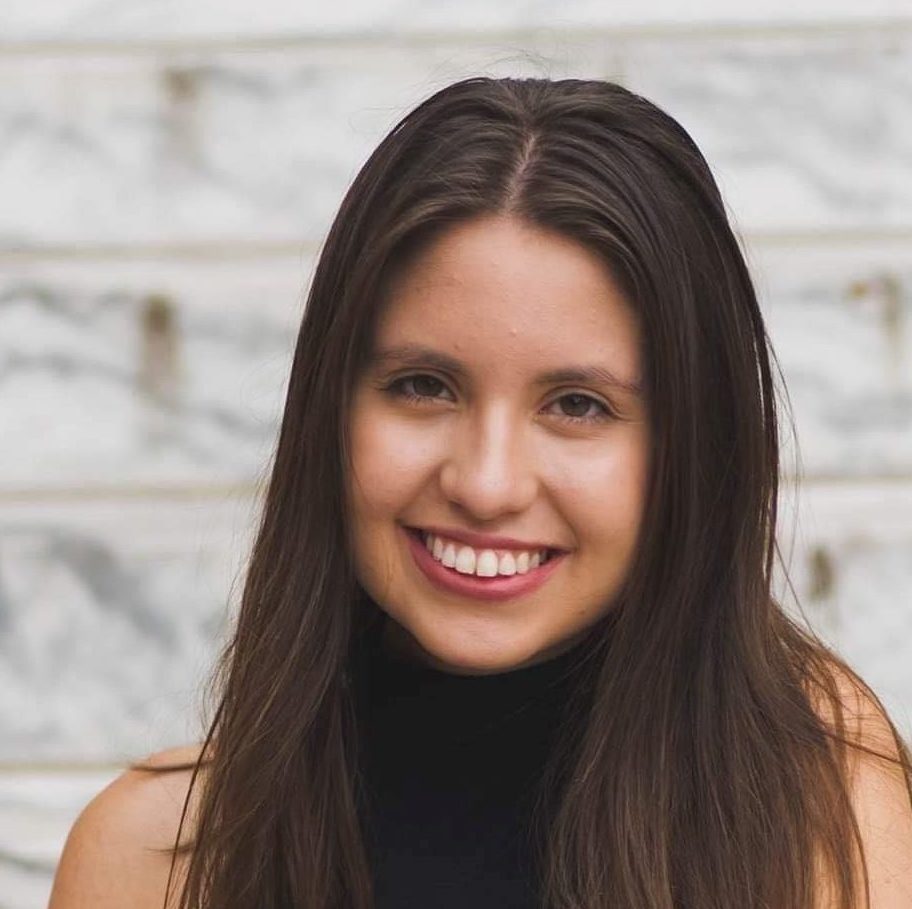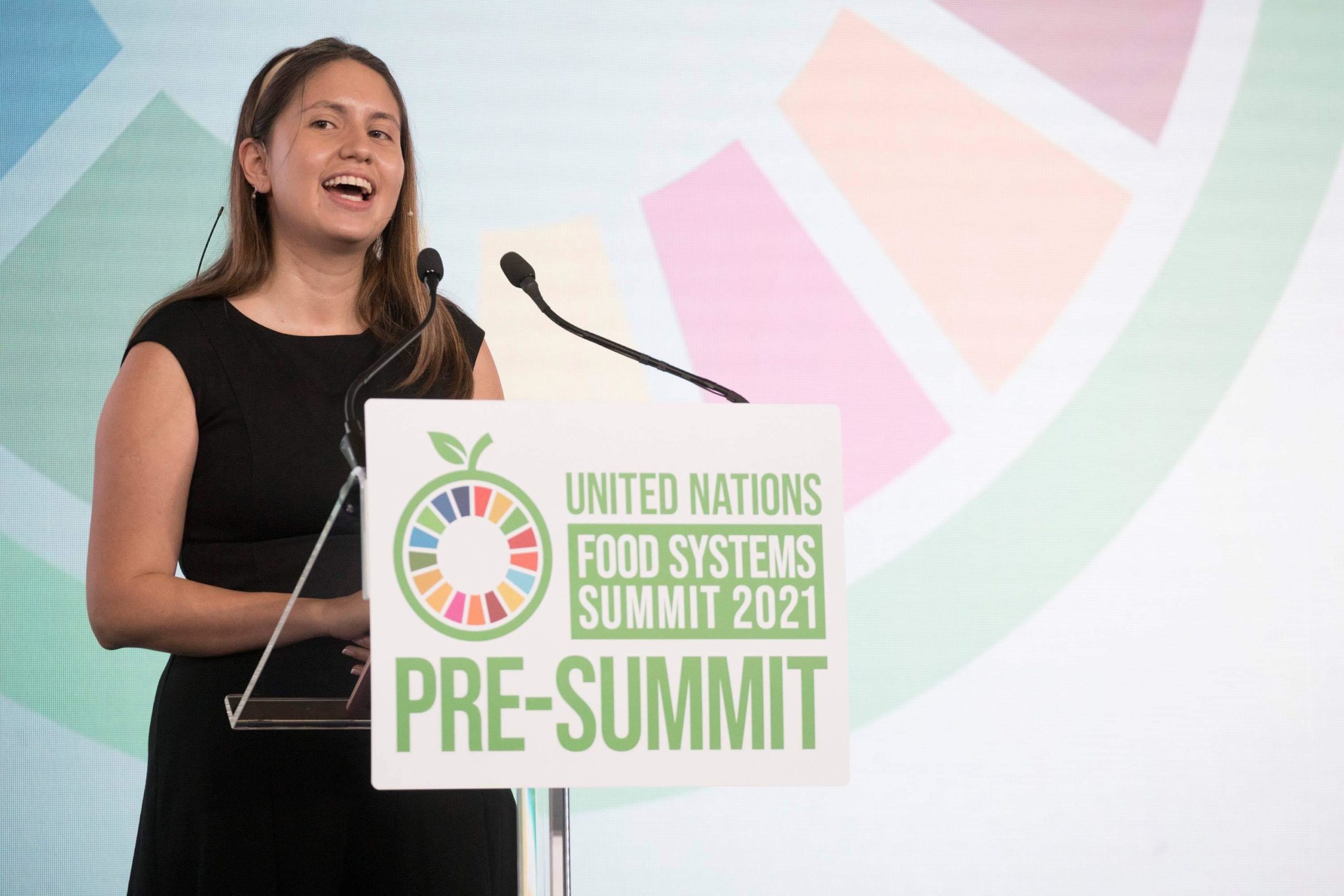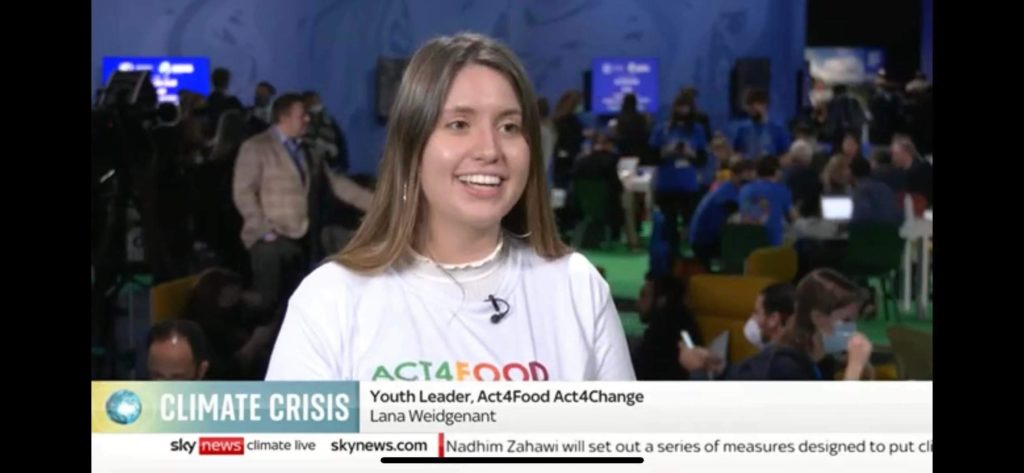Young People in the Activism Space: Lana’s Story
Read it in Portuguese on Um So Planeta: Jovens ativistas precisam ser ouvidos de verdade, e não apenas por conveniência
Lana is a young climate activist from Brazil, currently residing in the US. She is one of around 30 core group youth leaders of the Act4Food Act4Change campaign. Lana has spoken and raised young people’s voices at many international fora demanding climate justice with a focus on food systems transformation. Lana also works full-time in the food systems transformation now as a Campaigns and Policy Manager with ProVeg International. In this interview, Naina Qayyum talked to Lana about her journey so far and her experience of activism in the climate and food systems space.
Naina: Please tell us a bit about yourself.
Lana: My name is Lana Weidgenant. I am Brazilian and currently live in the United States. I consider myself a climate activist who focuses on food systems, and I have been involved in the school strikes for climate and also in organising with environmental organisations such as the international movement Zero Hour. I am passionate about the intersection of what we eat and how we produce food and everything in between, because it impacts the enormous issue of the climate crisis. I see often that it is not addressed as much as it should be. That’s why I got involved in initiatives such as Act4Food Act4Change and the UN Food Systems Summit, where I was Vice Chair of the action track focusing on shifting to sustainable consumption patterns.
Naina: Can you share your experience growing up in Brazil and what are some things you are proud of about your country?
Lana: I was born in Blumenau in Brazil, which is in the south. I moved to Joinville, which is close by and in the state of Santa Caterina. The nearest large city is Curitiba. For me one of the most amazing parts, and maybe it is me comparing it to a place like the United States, is that Brazil definitely has more of a community culture and a culture of looking out for one another, really valuing friends and family and the relationships you have. It is not as individualistic, so I think that’s really important when we are thinking about big issues like food systems and climate; having that strong value of looking out for one another and being close to your family. That is a value that ends up missing in a lot of western cultures.

Naina: When you mention activism or being an activist, often that word is taken in a negative way. What has your experience been like in that regard? When you tell people you are an activist, what types of reactions do you get?
Lana: That’s a good point. I think oftentimes we call ourselves activists because that’s how people like to label it. We have so many large causes to think about as activists that we do not often choose to fight over the wording, but it is really more of an organiser role. It is about doing work, organising people together and organising through different organisations. I think it can sometimes have a connotation of as an activist “you are going to show up outside the Capital Building and yell at people.” It can be seen that way at times. Activism is definitely more accepted in certain contexts and situations than others. Some conferences look out for activists and want to include people who consider themselves to be activists. But some might be concerned if you tell them, “I’m in Washington DC and I’m an activist.” They might think you are going to block their roads on the way to work in the morning or something like that. And the work is not directly that. There are activists who are more about direct action and others who aren’t. Really what it means for me is that there are causes you care about and you take action on consistently. A large number of people know that climate change is an enormous problem. Being a climate activist means that you consistently take action against that problem rather than just sitting with it and accepting that problem. It shouldn’t be a closed off group but something where anyone can participate. If you take action in any way against climate change, you are a climate activist too.
Naina: What type of environment have you found to be supportive and what type of environments have you found to be restrictive in doing climate activism work?
Lana: It is obviously easier in the US compared to Brazil. There is less to worry about in terms of safety for environment-focused activists and environmental defenders on the frontline. I think it’s easier in both places (US and Brazil) to be someone who isn’t directly stopping a pipeline and stopping the destruction of the Amazon Rainforest. For instance, in the US and DC and in big cities like São Paulo and Rio de Janeiro, it is generally easier having climate strikes if you are a young person in a big city and holding up a sign saying we need to act on climate change. However, in both places the more you are on the frontline, like the indigenous communities that are fighting to stop line 3, it can get very dangerous. In the US it has also turned into a violent situation against the activists multiple times. The people who aren’t impacted as frontline or indigenous communities and who choose to fight on the frontlines alongside them have also faced difficulties. And in the Amazon, I think it is worse for the indigenous population.
In both contexts you see that division. Growing up in Brazil, when I was younger, I did feel more fear in general. It’s not as accepted to just go out and say what you want to say as much as in the US where it is emphasised as a right from a very young age. You can feel a little bit more confident in that sense. I have seen a growing movement of young people in Brazil doing climate strikes, so I have seen that that is possible in more recent years. There is a stronger division in both places when you are an indigenous person fighting for your land or fighting against a pipeline through your water and trees. I think that’s where it gets more difficult in both settings.
At COP26, there was a Brazilian Indigenous leader, Alessandra Korap Munduruku who criticised the Brazilian government, and she received threats and had her home invaded when she returned. It was a similar situation for Txai Suruí, a young Indigenous activist from Brazil who spoke at the COP26 opening and received death threats afterwards. Bolsonaro saw her speech and said that this only happens to attack Brazil and that activists from other countries don’t speak negatively about their government, which is completely false. A number of activists came forward from the US and from Europe and said, “Yes, we do speak negatively about our governments, and we do not get threatened for doing so.” That kind of shows a difference in the mentality and risk involved in activism. At COP26, I saw many Brazilian and Indigenous activists as compared to a few years ago, and you think the situation must be fine, but then you see these threats and this home invasion happen within the last year, so that reflects more of the reality.
Naina: As you also mentioned, we are seeing more and more young people getting into activism and they are making the world acknowledge that they exist and that their opinions matter. Do you feel that young people’s voices are being heard?
Lana: Not really. I think young people are being seen to a higher extent so there is a larger awareness of young activists, especially in countries like the US. The celebration of youth activists is very strong. They love to do photo ops with young people, especially the younger you are, the cuter and more impressive it is for them. But I think there is still a challenge of young people actually being meaningfully heard and taken seriously. Attention must be paid to our strike demands and what young people are saying needs to happen rather than just having young people present for the sake of being nice and hopeful and cute. I think that the lack of meaningful engagement of young people still is a very big challenge.

Naina: What made you interested in climate and then what particularly made you move towards food systems?
Lana: There were large contributing factors that made me think about climate. One of them was being part of Generation Z and it has been a kind of terrible existential crisis you cannot really get rid of. Knowing that your generation is going to be amongst the most impacted if nothing is done about the climate crisis. Being from Brazil originally made me think about it more as well, seeing the issues, especially in the Amazon rainforest, which is the majority in Brazil, witnessing the international attention paid to these terrible fires that are worsening there and how they impact the environment and the climate. When I first moved to the US, I moved to the east coast, and I saw hurricanes there were worsening. The first time I left for college, my family was still on the east coast in the US. The hurricane hit and they lost power and I could not get in contact with them. There were few things that made this more prominent in my mind. I came to realise that there was something I could do, because before it seemed that I had to have at least graduated or be a climate scientist and have that scientific background. But then I saw the climate strikes movement happening in other countries outside of the US. I knew the US is the largest historical contributor to greenhouse gases. This country needed to have climate strikes as well. When I was able to step up and help bring that movement to the US and organise a national strike in Washington DC, that was the moment when I realised that I really could be involved in this at a larger scale and within the international climate movement. I had been engaged in volunteering before, trying to do small things in my community. Having had this existential dread and climate anxiety that we talk about with young people, that was the moment for me where I realised I could be part of the larger international movement of youth people against the climate crisis. That was in 2018.
I was engaged in food systems issues more broadly before I joined the international youth climate movement. I knew that climate and food systems could be connected particularly when I learned about the issues of factory farming. This is such a terrible issue in the US, and it is moving to countries like Brazil where the same pathways are being adopted that the US and European countries took. So, it is not even an isolated problem, but a spreading one. It is terrible for the climate, environment, water and air pollution, and social justice issues for workers, and communities. For animal welfare, they are in terrible conditions and of course emitting a lot of greenhouse gases. For me this was a great example of what is going wrong in our food systems. That we have these terrible kinds of production systems that are fuelling unsustainable consumption patterns and hidden conveniently so we do not know what is going on, so we as the public do not think about it when we go to the grocery store. This was what brought it all together for me.
I continue to stay involved in food systems. Even though the way our food systems are currently functioning, they are part of the problem, they can also be part of the solution if we do them right. I am hopeful that many amazing things can happen if we achieve better food production and consumption around the world.
Naina: It’s acknowledged that the climate is a crisis and that food systems are a major contributor. What do you think about summits and conferences where everybody gathers? How do you find these spaces? What is your feeling when you are in these spaces and when you come out of them, do you feel fulfilled?
Lana: It is a very draining experience, I think. A lot of young people I have spoken to at COP26 and at previous COPs would relate. It’s such a frustrating system and it’s so slow and it is not built to listen to young people and frontline populations like indigenous communities and environmental defenders. It is very difficult being there when you are told that young people are present in strong numbers and that we are so important. You hear in a lot of speeches that youth and children are of the highest priority, but we do not feel that anything we say is listened to and we don’t see it in the outcome documents. For COP, even if planto talk to negotiators ahead of time, to make a submission from youth on different topics,to work ahead of time, and plan the entire year, even doing that is not moving things fast enough. It is a slow bureaucratic process, and this process is what many of us are putting our hope into, because we don’t have much else. You’re going into a space where you know that here is where all the countries and leaders are coming together and that if we were going to turn things around, it would be a great place to do it, but then it just is not really set out to do that. It’s certainly frustrating. The UN Climate Change conferences are definitely not enough, we need to work on other solutions at the same time and other mechanisms to move forward and achieve the work that needs to be done. These conferences and negotiations have been happening for longer than I have been alive, and longer than my entire generation has been alive. It has not accomplished much, and the situation is becoming increasingly more urgent.

Naina: I also wonder, what are the reasons that these conferences keep happening, but we do not see the outcomes on the ground? What do you think are the reasons for that?
Lana: During the UN Food Systems Summit member states had an opportunity to share statements. You would see each of the representatives come up and make their three- or five-minute statement reading from what their country wants to say. What I have seen repeatedly is that these statements, overwhelmingly, are just countries saying what will best protect their economic interests. That is the same thing that we have seen in COP26. If a country has a large amount of economic interest in coal or oil, they will come to these negotiations and work to block action against coal and oil. When they have a large profit from the livestock industry, they come to the negotiations and work to block action on reducing the production and consumption of livestock
Naina: You have been part of many youth-led initiatives, such as e Act4Food Act4Change. What advice would you give to the generation that is coming after you based on your experience?
Lana: My go-to advice is that you do not need to wait for any specific moment or stage in your life to start doing what you want to do. You do not need a climate science degree; you do not need to have graduated from university or secondary school. Whatever you are passionate about, you can start engaging on that right now. It does not have to be an abstract grown-up year or time in the future. It could be something in the tiniest capacity in your free time. Just learning more about the causes you care about and becoming engaged in what you are interested in, in a learning sense and a community sense. Even if you decide to change your action area and do something else, it will still have been beneficial to have that experience.. Also, make sure to value your work and stand up for yourself too. It can be a little difficult to work in these spaces where a lot of the youth work is unpaid, it is for free, and people expect that you will give and not get much in return aside from exposure. It is important to set the boundaries and know what you would want in return for your time and how much are you willing to give.